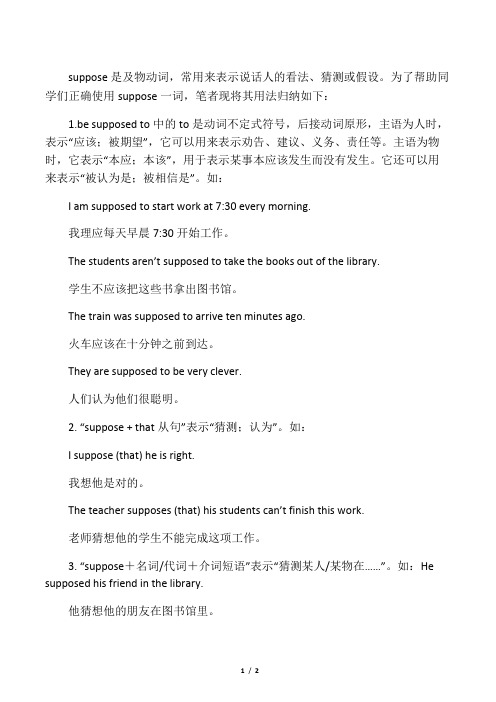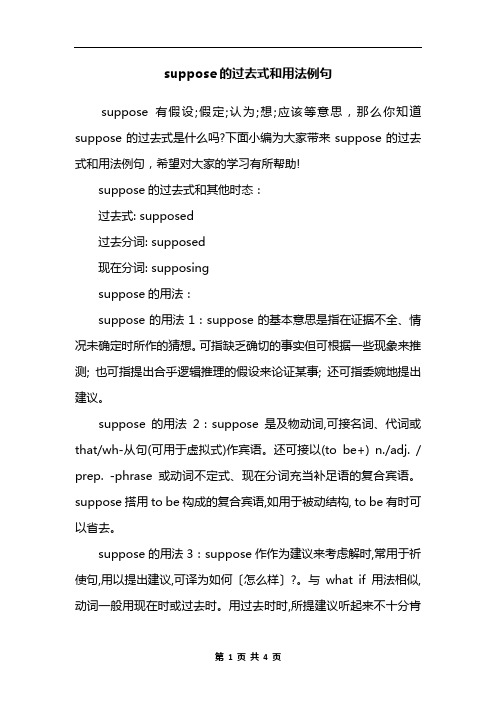Suppose的用法
suppose的用法 (2)

suppose的用法suppose是一个常见的动词,用于表示假设、设想和推测。
在英语中,suppose可以用于不同的情况和句型,具体用法如下:1. 表示假设suppose可以用于表达假设,即假定某种情形成立。
例如:•I suppose she will be here soon.(我想她很快就会来。
)•Let’s suppose, just for a minute, that we had all the money we wanted.(让我们假设,只是为了一分钟,我们有我们想要的所有钱。
)2. 表示推测suppose可以用于表示根据已有的信息或事实作出合理的推测。
例如:•They are running late. I suppose there must be traffic on the road.(他们迟到了。
我猜路上肯定有交通堵塞。
)•It’s been raining all day. I suppose the picnic will have to be canceled.(整天都在下雨。
我想野餐将不得不取消。
)3. 表示责备或怀疑suppose还可以用于表示对某人的责备、怀疑或猜测。
例如:•I suppose you forgot to lock the door.(我猜你忘记锁门了。
)•He is supposed to be the best in his field, but I don’t see anything special about him.(他应该是他领域中最好的,但我没有看出他有什么特别之处。
)4. 与句型搭配suppose还可以与一些特定的句型搭配使用,表达不同的含义。
以下是其中一些常见的句型:•suppose that + 句子:用于引导一个假设情况。
例如:Suppose that you won the lottery, what would youdo?•suppose (that) + 主语 + 动词:用于表达责备或怀疑。
Suppose的用法

suppose是及物动词,常用来表示说话人的看法、猜测或假设。
为了帮助同学们正确使用suppose一词,笔者现将其用法归纳如下:1.be supposed to中的to是动词不定式符号,后接动词原形,主语为人时,表示“应该;被期望”,它可以用来表示劝告、建议、义务、责任等。
主语为物时,它表示“本应;本该”,用于表示某事本应该发生而没有发生。
它还可以用来表示“被认为是;被相信是”。
如:I am supposed to start work at 7:30 every morning.我理应每天早晨7:30开始工作。
The students aren’t supposed to take the books out of the library.学生不应该把这些书拿出图书馆。
The train was supposed to arrive ten minutes ago.火车应该在十分钟之前到达。
They are supposed to be very clever.人们认为他们很聪明。
2. “suppose + that从句”表示“猜测;认为”。
如:I suppose (that) he is right.我想他是对的。
The teacher supposes (that) his students can’t finish this wo rk.老师猜想他的学生不能完成这项工作。
3. “suppose+名词/代词+介词短语”表示“猜测某人/某物在……”。
如:He supposed his friend in the library.他猜想他的朋友在图书馆里。
4. “suppose+名词/代词+to be”表示“猜想某人……”。
如:She supposed her sister to be in the park.她猜想她妹妹在公园。
I supposed the girl to be a teacher.我猜这个女孩是位老师。
suppose的基本用法

suppose的基本用法1. suppose + that 从句,表示“猜测;假定”。
如:I suppose that you are right. 我想你是对的。
You can suppose that A equals B. 你可以假定A等于B。
2. suppose +名词/ 代词+ to be...,表示“认为……是……”。
如:Many people suppose him to be over 50.许多人认为他已经50多岁了。
3. suppose用于祈使句中,表示“让……”。
如:Suppose we go for a swim.= Let's go for a swim. 让我们去游泳吧。
be supposed to 的用法用法一:be supposed to... 其中to是动词不定式符号,不是介词,其后要跟动词原形。
当be supposed to... 的主语是“人”时,意为“应该……”;“被期望……”,它可以用来表示劝告、建议、义务、责任等,相当于情态动词should。
如:Everyone is supposed to wear a seat-belt in the car.每个人在汽车里都应该系安全带。
Teachers are supposed to treat all the students alike.老师应该对所有的学生一视同仁。
用法:当be supposed to... 的主语是“物”时,它表示“本应;本该”,用于表示“某事本应该发生而没有发生”。
如:The new laws are supposed to prevent crime.这些新法令本应该起到防止犯罪的作用。
The train was supposed to arrive half an hour ago.火车本应在半小时之前到达。
用法三:be supposed to后面接“have + 过去分词”时,表示“本应该做某事而没做”。
suppose的过去式和用法例句

suppose的过去式和用法例句suppose有假设;假定;认为;想;应该等意思,那么你知道suppose的过去式是什么吗?下面小编为大家带来suppose的过去式和用法例句,希望对大家的学习有所帮助!suppose的过去式和其他时态:过去式: supposed过去分词: supposed现在分词: supposingsuppose的用法:suppose的用法1:suppose的基本意思是指在证据不全、情况未确定时所作的猜想。
可指缺乏确切的事实但可根据一些现象来推测; 也可指提出合乎逻辑推理的假设来论证某事; 还可指委婉地提出建议。
suppose的用法2:suppose是及物动词,可接名词、代词或that/wh-从句(可用于虚拟式)作宾语。
还可接以(to be+) n./adj. / prep. -phrase或动词不定式、现在分词充当补足语的复合宾语。
suppose搭用to be构成的复合宾语,如用于被动结构, to be有时可以省去。
suppose的用法3:suppose作作为建议来考虑解时,常用于祈使句,用以提出建议,可译为如何〔怎么样〕?。
与what if用法相似,动词一般用现在时或过去时。
用过去时时,所提建议听起来不十分肯定。
suppose的用法4:suppose作准许解时,常用于被动结构或否定结构,后接动词不定式。
suppose的用法5:suppose在主句中用过去时时,如宾语从句中的谓语动词所表示的动作先于suppose,则该动词须用过去完成时。
suppose的用法6:suppose在表示过去未曾实现的意图、打算或愿望时须用过去完成时。
suppose的用法7:suppose引导否定意义的宾语从句时,须使用转移否定结构。
suppose的用法8:suppose是表示思想状态的动词,通常不用于进行体。
suppose的用法9:在构成反意疑问句时,如果陈述部分是主从复合句, suppose用作主句谓语动词,则疑问部分应同从句的主谓语一致。
名校版英语经典句型考点解析 suppose句型和用法解析

名校版英语经典句型考点解析suppose句型和用法解析suppose句型和用法解析suppose 用法很灵活,在高考等考试中常以不同的面目出现。
现对suppose 的用法进行归纳总结。
1. suppose 意为“认为,猜测”,后常接“宾语+宾语补足语”形式。
1) suppose sb./sth. to have done 的结构。
I supposed her to have already left for home.我认为她已经动身回家了。
They supposed the paper to have been lost during the war. 他们认为那个文件在战争期间丢失了。
The police arrested him because he was supposed to have killed the lady. 警察逮捕了他,认为他杀死了那位女士。
2) suppose sb./sth. (to be) +形容词/ 介词短语/名词、不定式的结构。
She had supposed him (to be) very rich.她原以为他很有钱。
What makes you suppose him to be connected with them?你怎么会认为他与他们有联系呢?Everyone supposes him (to be) poor, but he is really quite wealthy. 大家都认为他很穷,实际上很阔。
She was supposed to be an excellent student in our school. 她被认为是我校优秀的学生。
I supposed her to have already left for home.我认为她已经动身回家了。
I never supposed him a hero.我从来没有认为他是一个英雄。
I had supposed his wife a younger woman.我原以为他妻子要更年轻。
Suppose用法

一、Suppose做及物动词,意为“想,认为,猜想,料想”,用法如下:1.suppose后接that引导的宾语从句,that可以省略,如:I suppose we’ll go there next week.我猜想我们下周将去那儿。
2.suppose +名词/代词+[ (to be)+表语]宾语补足语,如:What makes you suppose him to be connected with them?你怎么会认为他与他们有联系呢?3.suppose+名词/代词+不定式,如:I supposed her to have already left for home.我认为她已经动身回家了。
4. suppose+名词/代词+名词(宾语补足语),如:I never supposed him a hero.我从来没有认为他是一个英雄。
5.suppose+名词/代词+形容词(宾语补足语),如:We all suppose him clever.我们所有的人都认为他很聪明。
6. suppose+名词/代词+介词短语,如:I supposed him in the office.我想他在办公室。
7. suppose做插入语,如:You don’t mind my smoking, I suppose.我想你不会介意我抽烟。
使用suppose时应注意:1. I suppose可以用来有礼貌地要求一个肯定的答复,如:I suppose (that) you are very busy just at the moment?我想你这会儿正忙吧?2. suppose, guess与imagine的区别:suppose多用于口语,是试探性的,但有一定的根据;guess随意性很强,缺乏依据;imagine指“设想”、“想象”与众所周知的事实相反的东西,强调虚构和幻想。
如:I suppose they will leave here tomorrow.我猜他们明天要离开这儿了。
suppose的用法

suppose的用法suppose可用作及物动词,可接名词,代词或者从句。
可指缺乏确切的事实但可根据一些现象来推测; 也可指提出合乎逻辑推理的假设来论证某事; 还可指委婉地提出建议。
vt. 假定,猜想,推测,认为,让(用于祈祷语气)vi. 想象,猜想过去式: supposed;现在分词:supposing;过去分词:supposed;1.suppose的基本意思是指在证据不全、情况未确定时所作的猜想。
可指缺乏确切的事实但可根据一些现象来推测; 也可指提出合乎逻辑推理的假设来论证某事; 还可指委婉地提出建议。
2.suppose用作及物动词,可接名词、代词或that/wh-从句可用于虚拟式作宾语。
还可接以“to be+ n./adj. / prep. -phrase”或动词不定式、现在分词充当补足语的复合宾语。
suppose搭用to be构成的复合宾语,如用于被动结构, to be有时可以省去。
3.suppose作“作为建议来考虑”解时,常用于祈使句,用以提出建议,可译为“…如何〔怎么样〕?”。
与“what if”用法相似,动词一般用现在时或过去时。
用过去时时,所提建议听起来不十分肯定。
Suppose you have a thousand dollars, what will you do with it.假设你有一千美元,你会用它做什么。
Let us suppose another planet with conditions similar to those on the earth.让我们假定另外有一个具有和地球上相似条件的行星。
I suppose he would be about fifty when he obtained a doctorate.我推测他获得博士学位时大概是五十岁左右。
感谢您的阅读,祝您生活愉快。
Suppose的用法

Suppose的用法suppose是及物动词,常用来表示说话人的看法、猜测或假设。
为了帮助同学们正确使用suppose一词,笔者现将其用法归纳如下:1. be supposed to中的to是动词不定式符号,后接动词原形,主语为人时,表示“应该;被期望”,它可以用来表示劝告、建议、义务、责任等。
主语为物时,它表示“本应;本该”,用于表示某事本应该发生而没有发生。
它还可以用来表示“被认为是;被相信是”。
如:I am supposed to start work at 7:30 every morning. 我理应每天早晨7:30开始工作。
The students aren’t supposed to take the books out of the library. 学生不应该把这些书拿出图书馆。
The train was supposed to arrive ten minutes ago. 火车应该在十分钟之前到达。
They are supposed to be very clever. 人们认为他们很聪明。
2. “suppose + that从句”表示“猜测;认为”。
如:I suppose (that) he is right. 我想他是对的。
The teacher supposes (that) his students can’t finish this work. 老师猜想他的学生不能完成这项工作。
3. “suppose+名词/代词+介词短语”表示“猜测某人/某物在……”。
如:He supposed his friend in the library. 他猜想他的朋友在图书馆里。
4. “suppose+名词/代词+to be”表示“猜想某人……”。
如:She supposed her sister to be in the park. 她猜想她妹妹在公园。
I supposed the girl to be a teacher. 我猜这个女孩是位老师。
- 1、下载文档前请自行甄别文档内容的完整性,平台不提供额外的编辑、内容补充、找答案等附加服务。
- 2、"仅部分预览"的文档,不可在线预览部分如存在完整性等问题,可反馈申请退款(可完整预览的文档不适用该条件!)。
- 3、如文档侵犯您的权益,请联系客服反馈,我们会尽快为您处理(人工客服工作时间:9:00-18:30)。
Suppose的用法suppose 一词的用法很灵活,在高考中常以不同的面目出现。
这里对 suppose 的用法进行归纳总结。
1. suppose 意为“认为,猜测”,后常接“宾语+宾语补足语”形式。
① suppose sb./sth. (to be) +形容词 / 介词短语的结构。
Everyone supposes him (to be) poor, but he is really quite wealthy. 大家都认为他很穷,实际上很很阔。
She was supposed to be an excellent student in our school. 她被认为是我校优秀的学生。
② suppose sb./sth. to have done 的结构。
They supposed the paper to have been lost during the war. 他们认为那个文件在战争期间丢失了。
The police arrested him because he was supposed to have killed the lady. 警察逮捕了他,认为他杀死了那位女士。
③ suppose + it +形容词 / 名词+ to do 的结构。
I suppose it my duty to help those in poverty. 我认为帮助那些处于贫困中的人是我的义务。
2. suppose 可用于“ be supposed +不定式”的结构。
① be supposed to do sth. = should do sth. 意为“应该 / 理应做某事”,表示被期望或被要求(按规则、惯例)做某事。
We are supposed to help each other. 我们理应互相帮助。
(要求)You are supposed to hand in your papers before class is over. 希望你下课前交卷子。
(期望)② be not supposed to do sth. 常用来表示不允许或禁止做某事,表示委婉的禁止。
Students are not supposed to play football in the classroom. 学生不允许在教室里踢足球。
③ be supposed to have done = should have done =ought to have done 表示“过去本该做某事但实际上未做”。
The train is supposed to have arrived an hour ago. 火车应该在 1 小时前到达。
3. suppose 可用过去完成时表示“未曾实现的愿望”。
We had supposed that we would be able to see more of Shanghai, but time didn't permit. 我们本打算能多看看上海,但时间却不允许了。
注意:与 suppose 这种用法相同的还有: hope, think, expect, mean, want, intend, plan (一些表示心理状态的动词)等。
4. suppose 可用于“ suppose + that (从句)”句型。
What makes you suppose (that) I'm against it? 你根据什么认为我反对这件事?It was generally supposed that it would not happen again. 一般认为此事不会再发生。
5. 由 suppose 引导的宾语从句,如果主句的主语是第一人称 I 或 we ,并且主句谓语是一般现在时态,从句的否定一般要转移到主句上来,其反意疑问句一般与宾语从句一致。
I don't suppose for a minute that he'll agree. 我认为他决不同意。
We don't suppose they will say sorry to her, will they? 我们认为他们不会对她说对不起,是吧?注意:与 suppose 这种用法相同的还有: think, believe, imagine, expect 等。
6. suppose 可用于简略答语中,用 so 代替一个肯定的宾语从句;用 not 代替一个否定的宾语从句。
— Do you suppose he'll fail to catch the train?—你认为他会错过火车吗?— I suppose so./ I suppose not. (= I don't suppose so. )—我想会的。
/ 我想不会。
注意:与 suppose 这种用法相同的还有: think, believe, expect, imagine 等。
但应注意 hope 和 be afraid 则不同于以上的用法。
— Will he win the game?—Yes, I hope so./No, I hope not. (不能用 I don't hope so. )7. suppose 可用于插入语中。
① do you suppose 用作插入语,用来征询对方对某事的看法,常放在疑问词的后面,并且句子要用陈述语序。
What do you suppose made her so angry? 你认为什么事使她如此生气?When do you suppose we shall begin our class? 你认为我们什么时候开始上课?注意:与 suppose 这种用法相同的还有: believe, expect, think, imagine, guess 等。
② I suppose 也可用作插入语,表示说话者的态度或看法,常用于句中或句末。
You don't mind my smoking, I suppose? 我想你不会介意我抽烟吧?She'll be there today, I suppose. 我想她今天能到那儿去。
8. suppose ( = supposing) 可引导条件状语从句,意为“如果,假如”。
Suppose ( = Supposing) he is absent, what shall we do? 假如他缺席,我们怎么办?注意:如果想表示“即使”,应用 supposing 而不用suppose 。
Supposing you miss him, he is not likely to miss you. 即使你碰不到他,他也可能碰到你。
注意: suppose 或 supposing 引导的条件状语从句应用一般现在时代替将来时。
9. suppose 用来表示建议,常用在祈使句中,意为“……怎么样”。
Suppose we go to the seaside for the weekend. 我们去海边度周末怎么样?[练习]1. I don't suppose anyone will volunteer,_____________?A. do IB. don't IC. will theyD. won't they2. Suppose he _________ the truth, how shall we deal with him?A. won't tellB. didn't tellC. doesn't tellD. hadn't told3. I suppose ___________. Which one is wrong?A. your daughter very beautifulB. your daughter to be very beautifulC. that your daughter is very beautifulD. your daughter's being very beautiful4. The professor also mentioned an article __________ by Lu Xun.A. supposed to have been writtenB. supposed to be writingC. supposing to have been writtenD. supposing to be written5. — You ___________ part in the party in time.— Sorry, I was delayed by the accident.A. are supposed to takeB. have supposed to takeC. are supposed to have takenD. supposed to take6. He was supposed ___________ a college graduate but he knew nothing of history.A. to beB. beingC. to have beenD. having been7. If you go to Xi'an, you'll find the places there more magnificent than commonly ________.A. supposingB. supposedC. to supposeD. supposeKeys: CCDACAB(注:专业文档是经验性极强的领域,无法思考和涵盖全面,素材和资料部分来自网络,供参考。
可复制、编制,期待你的好评与关注)。
